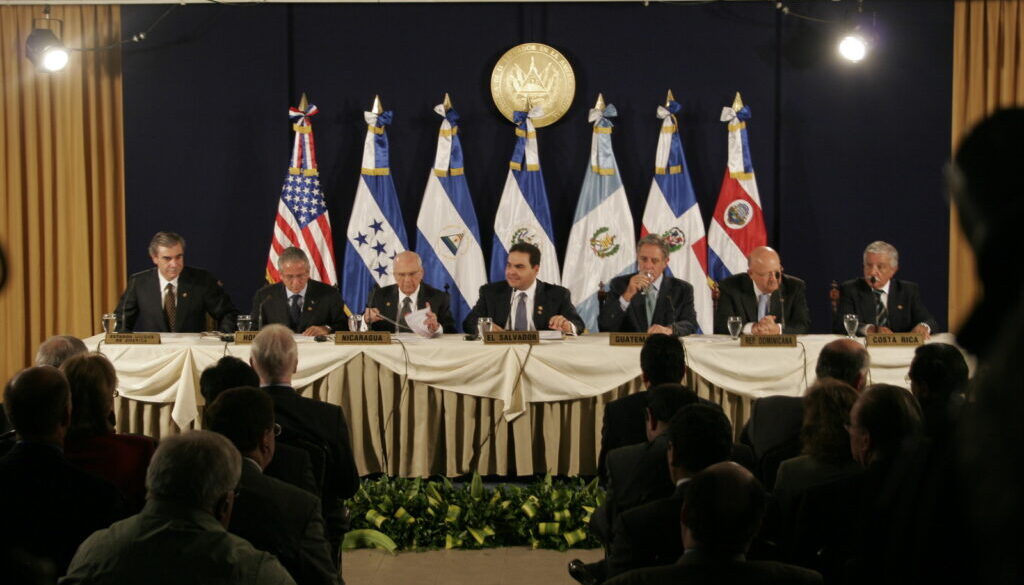Trade policies in El Salvador expand the country’s economic relationships
Table of Contents
Contact the Central American Group to invest in manufacturing in El Salvador.
As a result of trade policies in El Salvador, the Central American nation has entered into a diversity of free trade agreements (FTAs).
El Salvador is a small country located in Central America. It is approximately the size of the US state of Massachusetts and has a population of roughly 6.5 million people. Over the last decades, the country has implemented trade and commercial policies to promote economic growth and development. As a result, trade policies in El Salvador have significantly impacted the country’s economy and have played a key role in shaping the nation’s economic and investment strategies.
The CAFTA-DR Free Trade Agreement is a cornerstone of trade policies in El Salvador
One of the central trade policies in El Salvador that has been implemented is the Central America-United States Free Trade Agreement (CAFTA-DR). This commercial accord was signed in 2004. The agreement eliminated tariffs on a wide range of goods and services between the United States, El Salvador, and other countries in the region, including Honduras, Nicaragua, Guatemala, Costa Rica, and the Dominican Republic. As a result, this commercial agreement has increased trade and investment between the US and El Salvador. In addition, it has helped create jobs and stimulate economic growth in the latter country.
According to the Salvadoran government statistics, trade between itself and the United States has increased by approximately 50% since the agreement came into effect. Additionally, the deal has helped to increase exports of El Salvador goods and services to the United States, which has led to increased economic growth and job creation in the country. Among the most exported Salvadoran products to the US are t-shirts, sweaters, sugar, plastic products, electronic micro-capacitors, and sugar.
Another vital trade policy implemented by El Salvador is its participation in the Pacific Alliance. This commercial accord is a regional trade agreement that includes Mexico, Chile, Colombia, and Peru in its membership. The Pacific Alliance promotes free trade, investment, and economic integration among the participating countries. El Salvador’s accession to the alliance has helped the country increase its exports to its partner nations and attract more foreign investment.
El Salvador is a major exporter of textiles in the region
The main exports of El Salvador to the Pacific Alliance countries are textiles and apparel, as well as agricultural products such as sugar. In addition to the already mentioned free trade agreements, El Salvador has bilateral accords with Colombia, Taiwan, Chile, Mexico, Panama, and South Korea. Furthermore, the country has Partial Scope Agreements (PSAs) with Bolivia, Cuba, Trinidad and Tobago, Ecuador, and Venezuela and announced its intention to enter into an FTA with China at the beginning of November 2022.
El Salvador has also actively sought to participate in multilateral trade agreements such as the Trans-Pacific Partnership (TPP) and the Comprehensive and Progressive Agreement for Trans-Pacific Partnership (CPTPP). These agreements aim to promote trade and investment among the participating countries. Therefore, trade policies in El Salvador will allow for the country’s inclusion in these agreements and help it increase its exports and attract more foreign investment.
In addition to these trade policies, El Salvador has also implemented other measures to promote economic growth and development, such as attracting foreign direct investment, developing infrastructure, and promoting education and training programs. These policies have helped to create jobs and stimulate economic growth in the country.
Trade policies in El Salvador create some challenges
However, only some of the impacts of these trade policies have been optimal. For example, El Salvador has faced challenges like job displacement and a decrease in some sectors like agriculture and textiles. Furthermore, the trade policies in El Salvador have also led to increased imports of goods and services from other countries, which has led to increased competition for domestic producers in some instances. This has created concerns about the potential negative impact of these trade policies on the country’s economy that some sectors of the population have voiced.
In conclusion, El Salvador has implemented trade policies to promote economic growth and development. These policies have significantly impacted El Salvador’s economy and have played a key role in shaping the country’s trade and investment policies. Furthermore, they have increased trade and investment between El Salvador and other countries and regions around the world and helped create jobs and stimulate economic growth in El Salvador. However, the government needs to address the challenges these policies have brought to some sectors and the economy as a whole.
Contact Us
Please use this form to contact us and we will respond as soon as possible:
Contact Us
Please use this form to contact us and we will respond as soon as possible:
Contact Us
Please use this form to contact us and we will respond as soon as possible:
Contact Us
Please use this form to contact us and we will respond as soon as possible:





